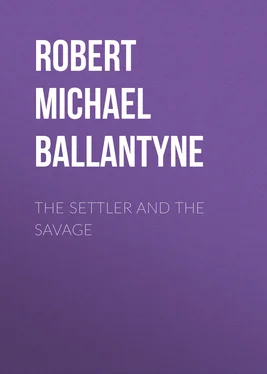Robert Michael Ballantyne - The Settler and the Savage
Здесь есть возможность читать онлайн «Robert Michael Ballantyne - The Settler and the Savage» — ознакомительный отрывок электронной книги совершенно бесплатно, а после прочтения отрывка купить полную версию. В некоторых случаях можно слушать аудио, скачать через торрент в формате fb2 и присутствует краткое содержание. Жанр: Детские приключения, literature_19, foreign_antique, foreign_prose, foreign_children, на английском языке. Описание произведения, (предисловие) а так же отзывы посетителей доступны на портале библиотеки ЛибКат.
- Название:The Settler and the Savage
- Автор:
- Жанр:
- Год:неизвестен
- ISBN:нет данных
- Рейтинг книги:4 / 5. Голосов: 1
-
Избранное:Добавить в избранное
- Отзывы:
-
Ваша оценка:
- 80
- 1
- 2
- 3
- 4
- 5
The Settler and the Savage: краткое содержание, описание и аннотация
Предлагаем к чтению аннотацию, описание, краткое содержание или предисловие (зависит от того, что написал сам автор книги «The Settler and the Savage»). Если вы не нашли необходимую информацию о книге — напишите в комментариях, мы постараемся отыскать её.
The Settler and the Savage — читать онлайн ознакомительный отрывок
Ниже представлен текст книги, разбитый по страницам. Система сохранения места последней прочитанной страницы, позволяет с удобством читать онлайн бесплатно книгу «The Settler and the Savage», без необходимости каждый раз заново искать на чём Вы остановились. Поставьте закладку, и сможете в любой момент перейти на страницу, на которой закончили чтение.
Интервал:
Закладка:
Considine received the opening sentences of this proposal with a smile, but as the farmer went on he became grave, and at length seriously entertained the idea. After having slept a night over it he finally resolved to accept the offer, and next day was fairly installed as dominie and a member of the farmer’s family. School-books were ferreted out from the bottom of family chests; a Hottentot’s (or Tottie’s) mud-hut was converted into a schoolroom; six of the farmer’s sons—beginning almost at the foot of the scale—formed a class. Reading, writing, and arithmetic were unfolded to youthful and not unwilling minds, even Latin was broached by the eldest of the six, and, during a separate hour in the evening, French was taught to Bertha. Everything, in short, was put in train, and, as Considine expressed it, “the Marais Academy was going full swing,” when an event occurred which instantly sent French and Latin to the right-about and scattered the three R’s to the four winds.
This was nothing less than an order from the Colonial Government to the Field Cornets on the frontier to engage waggons and oxen from the farmers, to be sent to Algoa Bay for the purpose of conveying the British immigrants—expected in a few weeks—from the coast to the various locations destined for their reception.
Among others, Conrad Marais was to send two waggons and spans of oxen, each span consisting of eighteen animals. Hans Marais was to go in charge, and Hans resolved to have Considine as a companion, for the journey down to the coast was long—about 160 miles,—and the two youths had formed so strong an attachment during their short acquaintance that Considine was as anxious to go as his friend could desire.
Conrad Marais, having no objection to this arrangement, the oxen were “inspanned,” and the day following that on which the order was received they set off towards the shores of the Indian Ocean.
Having to pass the residence of Jan Smit on the way, Considine seized the opportunity to visit his former cross-grained companion and pay his debt.
Jan Smit was in a more savage humour than usual when the young man walked up to his dwelling. The farmer’s back was towards him as he approached. He stood nervously switching a sjambok in his right hand, while he stormed in Dutch at three of his unfortunate people, or rather slaves. One was a sturdy Hottentot named Ruyter, one a Malay named Abdul Jemalee, both of whom had travelled with Considine on the up journey. The third was the Bushman whom he had encountered when lost on the karroo, and who, owing to his inveterate stupidity, had been named Booby.
They had all been implicated in the recent loss of cattle suffered by their savage master, who had already flogged the Bushman with the sjambok and was furiously interrogating the Hottentot. At last he gave him a tremendous cut across the shoulders, which immediately raised a dark red bar thereon.
Ruyter’s black eyes flashed. He did not wince, but drew himself quickly up like a man about to retaliate. Jan Smit observing and resenting the action, at once knocked him down.
Ruyter slowly rose and staggered away just as Considine came up. The youth could not resist the inclination to exclaim “Shame!”
“Who dares—” cried Jan Smit, turning fiercely round. He paused in mute surprise at sight of his former companion.
“ I dare!” said Considine sternly; “many a time the word has been on my lips before, and now that it has passed them it may go. I came not here, however, to bully, or be bullied, but to pay my debt to you.”
He drew out a leathern purse as he spoke, and the Dutchman, whose spirit was quelled both by the manner and the matter of his visitor’s remark, led the way to his domicile.
The house resembled that of Conrad Marais in form, but in nothing else. Everything in and around it was dirty and more or less dilapidated. There was no dam, no garden,—nothing, in short, but the miserable dwelling and a few surrounding huts, with the cattle kraal.
Having paid his debt, Considine did not vouchsafe another word, but returned at once to the waggons. On the way he overtook Ruyter.
“My poor fellow,” he said, “have you no means of redress? Can you not complain to some one—some magistrate?”
“Complain!” exclaimed the Hottentot fiercely, “what de use of complain? No one care. Nobody listen—boh! no use complain.”
The man had learnt a smattering of English. He was a short but very powerful fellow, and with a more intellectual head and countenance than is common to his race.
“Where are you going just now, Ruyter?” asked Considine, feeling that it was best to change the subject just then.
“Go for inspan de waggin. Ordered down to Algoa Bay for bring up de white men.”
“Then we shall probably meet on the road,” said Considine, “for I am going to the same place.” As he spoke, they came to a point where the road forked. The Hottentot, with a sulky “Good-day,” took that path which led towards Jan Smit’s cattle kraal, while Considine followed the other and rejoined his waggons. The two friends mounted their horses, the drivers set the ox-teams in motion, and the huge waggons lumbered slowly over the karroo towards the rising sun.
Chapter Three.
Describes the somewhat Curious Beginning of Settler-Life in South Africa
Leaping over time and space with that hilarious mental bound which is so easy and enjoyable to writers and readers, let us fold our wings at early morn in the month of May, and drop down on the heights in the vicinity of Algoa Bay.
The general aspect of the bay is sandy and sterile. On its blue waters many large vessels lie at anchor. Some of them are trim, with furled sails and squared yards, as if they had been there for a considerable time. Others have sails and spars loose and awry, as if they had just arrived. From these latter many an emigrant eye is turned wistfully on the shore. The rising ground on which we stand is crowned by a little fortress, or fortified barrack, styled Fort Frederick, around which are the marquees of the officers of the 72nd regiment. Below, on the range of sandhills which fringe the beach, are pitched a multitude of canvas tents, and among these upwards of a thousand men, women, and children are in busy motion. There are only one or two small wooden houses visible, and three thatched cottages. Down at the water’s edge, and deep in the surf, crowds of soldiers, civilians, and half-naked natives are busy hauling on the ropes attached to the large surfboats, which are covered to overflowing with human beings. Those in the boats, as well as those in the surf and on the beach, are in a state of high excitement, and more or less demonstrative, while the seamen from a neighbouring sloop of war, who manage the boats, shout to the people at the ropes. The replies of these are drowned, ever and anon, by the roar of falling “rollers.” These rollers, or great waves, calm though the morning be, come in with giant force from the mighty sea. They are the mere termination of the ocean-swell.
Reader, the scene before you marks an epoch of vast importance in South African history. It is the “landing of the British Settlers” in the year 1820. The spot is that on which now stands the flourishing commercial town of Port Elizabeth, styled, not inappropriately, by its inhabitants, the “Liverpool of South Africa.”
Standing near the stern of one of the surf-boats, his strong right hand grasping the gunwale, and his grave eyes fixed on the shore, one of the exiles from Scotland lifted his voice that day and said—
“Hech, sirs! it’s but a puir, ill-faur’d, outlandish sort o’ country. I wad fain hope the hieland hills of our location inland are mair pleasant-lookin’ than this.”
“Keep up your spirits, Sandy Black,” observed a sturdy Highlander who stood at his side; “those who know the country best say that our location is a splendid one—equal to Scotland itself, if not superior.”
Читать дальшеИнтервал:
Закладка:
Похожие книги на «The Settler and the Savage»
Представляем Вашему вниманию похожие книги на «The Settler and the Savage» списком для выбора. Мы отобрали схожую по названию и смыслу литературу в надежде предоставить читателям больше вариантов отыскать новые, интересные, ещё непрочитанные произведения.
Обсуждение, отзывы о книге «The Settler and the Savage» и просто собственные мнения читателей. Оставьте ваши комментарии, напишите, что Вы думаете о произведении, его смысле или главных героях. Укажите что конкретно понравилось, а что нет, и почему Вы так считаете.












